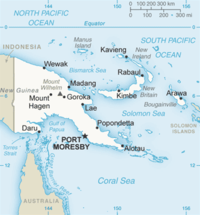
Photo from wikipedia
BackgroundThe Papua New Guinea Department of Health recently shifted from a presumptive to a ‘test and treat’ malaria case management policy. This shift was supported by the widespread introduction of… Click to show full abstract
BackgroundThe Papua New Guinea Department of Health recently shifted from a presumptive to a ‘test and treat’ malaria case management policy. This shift was supported by the widespread introduction of malaria rapid diagnostic tests in health facilities across the country. Health workers received training and job-aids detailing how to conduct and interpret a malaria rapid diagnostic test and how to treat test positive cases; however, little instruction on treating non-malaria febrile cases was provided. Accordingly, this study examined health worker case management of non-malarial febrile patients in the 12-month period immediately following the introduction of the revised malaria case management policy.MethodsData were collected from a country-wide cross-sectional survey of febrile case management at randomly selected health facilities and from longitudinal surveillance at sentinel health facilities. Analysis was restricted to febrile patients who tested negative for malaria infection by rapid diagnostic test (N=303 and 5705 outpatients, respectively).Results and Discussion96.8% of non-malarial febrile patients received a diagnosis in the longitudinal sample, compared to 52.4% of the cross-sectional sample. Respiratory tract infections were the most commonly reported diagnoses. Over 90% of patients in both samples were prescribed one or more medications, most commonly an analgesic (71.3 & 72.9% of the longitudinal and cross-sectional samples, respectively), some form of antibiotic (72.7 & 73.4%, respectively) and/or an anthelminthic (17.9 & 16.5%, respectively). Prescribing behaviour was adherent with the recommendations in the standard treatment guidelines in fewer than 20% of cases (longitudinal sample only).ConclusionMany non-malarial febrile patients are not provided with a diagnosis. When diagnoses are provided they are typically some form of respiratory tract infection. Antibiotics and analgesics are widely prescribed, although medications prescribed rarely adhere to the Papua New Guinea standard treatment guidelines. These findings indicate that Papua New Guinea health workers require support for non-malarial febrile illness case management.
Journal Title: BMC Health Services Research
Year Published: 2017
Link to full text (if available)
Share on Social Media: Sign Up to like & get
recommendations!